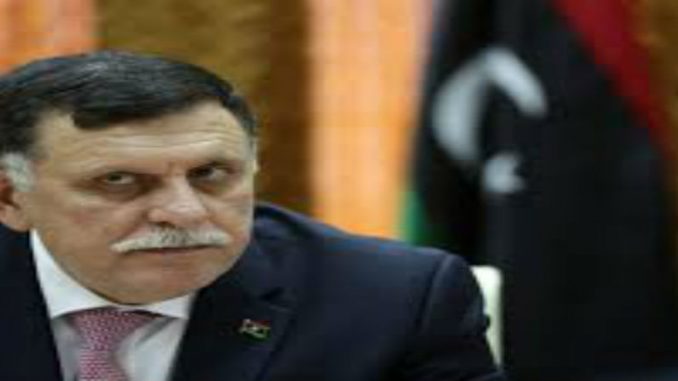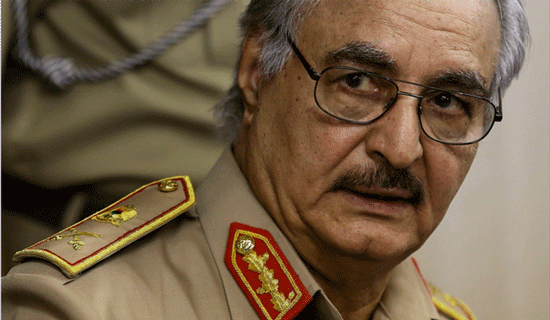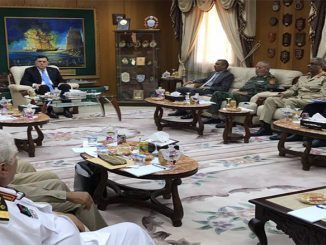
Three leading Libyan political figures, including al-Serraj escaped a failed assassination attempt in Tripoli yesterday.
A motorcade transporting Presidency Council head/Government of National Accord prime minister Fayez al-Serraj, Head of the State Council Abdulrahman Sewehli and the Presidential Guard Najmi Nakoa, came under ”heavy shooting” as it drove by on the motorway in Tripoli, according to Libya Herald.
A black Toyota Cruiser with two passengers drew up to the motorcade and opened fire at it. The State Council media office said that the firing came from ”the armed groups based in the (Rixos) Palaces” area of Tripoli. It also reported that two guards in the motorcade were slightly injured, both the PC/GNA Media department and official spokesman Ashraf Tulty refuted any injuries.
The SC Media office reported that three leaders were currently in an ”emergency” meeting in Tripoli.
Later, Abdulrahman Swehli named Khalifa Ghwell as being behind the incident. The Rixos complex and Guest Palaces is the old home of the former General National Congress and the base of self-declared prime minister Khalifa Ghwell and his so-called Government of National Salvation.
“The PC/GNA said that its forces gave chase to the attackers with the aim of arresting them and referring them to the judiciary,”according to Libya Herald.
Later, the PC/GNA media department released Photos showing al-Serraj and Sewehli officially opening the Central Investigation Department in Drebi. The incident was said to have occurred on their way back from that function.
In January 2017, Forces loyal to self-declared prime minister Khalifa Ghwell seized at least three ministries in Libya’s capital, declaring what appeared to be a miniature coup after what he described as a yearlong failure of the current U.N.-backed premier.
Khalifa Ghwell said that his forces control the ministries of defense, labor and the “martyrs and the wounded.”
Ghwell announced in a televised speech that all the past arrangements brokered by the U.N. are “invalid,” and described al-Serraj’s government as “expired.”
In addition, he ordered his forces that he referred to as the “Presidential Guard,” to secure the capital and warned other militias to stand down.
He also called for new talks among Libyan factions without foreign mediators.
Ghwell said, “We are the ones with legitimacy,” and he added,”We extend our hands to our Libyan rivals.”
He continued,”God’s Shariah will rule among us,” without elaborating.
Ghwell added that the conditions have gone “from bad to worse” in the year since al-Serraj’s government was formed, as the country has fallen in to a financial crisis.
“We gave him a year, and when he failed, we decided to return (to power)” Ghwell said.
In October, armed groups backing Ghwell “took control of a complex used by a parliament aligned with the GNA, and Ghwell has made several public appearances in which he has challenged the GNA’s authority,”said Reuters.
In 2014, the National Salvation government was formed by the outgoing parliament after a disputed transfer of power that led to the establishment of rival governments, each backed by an array of militias.
Last year, the U.N. brokered the establishment of a third government in Tripoli under the leadership of Fayez al-Serraj, a Western-backed technocrat, hoping he could unify Libya and lead the fight against Islamic extremists.
However,the GNA has largely failed to impose its authority and restore the country’s unity, although the Islamic State has been ousted from its former stronghold of Sirte and oil production has recovered slightly.
Since the Libyan Revolution that overthrew the long-time dictator 2011 Muammar Gaddafi, violence has spread in Libya among the different Libyan factions.
The GNA, the third government formed, has been unable to win endorsement for a cabinet from a parliament based in the east of the country, as other power-brokers, as Egypt,UAE,and France,have continued to back a rival government as armed forces allied to them and under the command of Gen. Khalifa Haftar have made military gains on the ground.
Moreover, although the GNA has gradually taken control of some ministries in Tripoli, but it has been unable to improve security or deal with a liquidity crisis, steep inflation, and a collapse in public healthcare provision.
In addition, the Presidential Council is made up of nine members who should represent different geographical regions and political currents within Libya.
The Council has been divided as two of its number mostly boycotting proceedings, and at the same time, different members regularly issuing contradictory statements.
It is noteworthy that the deputy leader of the GNA Musa al-Koni resigned this month and he saying the U.N.-backed administration had failed to tackle urgent problems arising from years of conflict and political disarray.
Koni said in a press conference in Tripoli said, “I announce my resignation due to the failure of the Presidential Council, because it holds responsibility for the killing, kidnapping, and rape that happened over the past year.”
On the other hand, a spokesman for Serraj’s government dismissed the moves by Ghwell’s forces, saying “they are trying to sow chaos but they have no means to control.”
He said the ministries Ghwell claimed to have seized are either under maintenance, not controlled by al-Serraj’s government, or were seized briefly before being let go, as reported by Reuters.
Ashraf Tulty said, “This is nothing more than a media hoax.” He added, “They are trying to sabotage the only internationally-recognized government in Libya.”
The claims and counter-claims between both governments show the extreme weakness of the U.N.-backed Government of National Accord (GNA) as well as the major challenges facing it on all fronts.
First, the disorder in Tripoli after the returning of Ghwell forces in to the city.
Second, Haftar’s growing power supported by Egypt, UAE, France and lately Russia enabled him to expand his power in the east.
In addition, al-Sisi, Haftar’s close ally, has brokered recently amending the Skhirat agreement in a way that suits General Khalifa Haftar.
On December 13, 2016, Cairo hosted a conference attended by Libyan officials and representatives from the country’s numerous factions, where they issued a declaration of principles and five proposed amendments to an agreement, brokered by the UN in 2015.
The conference concluded an agreement on amending the 8th article of the 2015 agreement that outline the authorities of the Libyan army chief commander.
The article constituted a major obstacle during signing Skhirat agreement as it included the exclusion of General Khalifa Haftar from leading the army.
Third, Al-Serraj has lost control over the oil crescent terminals after Haftar had taken over oil facilities in eastern Libya from Petroleum Facilities Guards, a rival militia force allied to the UN-backed government in the capital, Tripoli.



